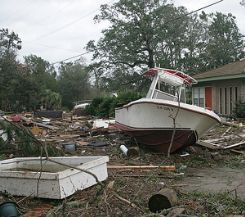Where There's a Will, There's a Way to Hold Back the Sea: Prof. Ken Bode
November 4, 2005
 November 4, 2005, Greencastle, Ind. - "Here along the cobblestone streets and canals of this 12th-century village, tight against the dike that protects it from the waters of the Zeider-zee, I was thinking about what House Speaker Dennis Hastert said about New Orleans," begins an op-ed column by Ken Bode written as he vacationed in Edam, Holland. "Hastert said we shouldn't bother rebuilding that city because it was stupidly located below sea level. In the old section of Edam, it is impossible to walk 30 yards without crossing a canal," notes Bode, Eugene S. Pulliam Distinguished Visiting Professor of Journalism. His essay is published in today's Indianapolis Star.
November 4, 2005, Greencastle, Ind. - "Here along the cobblestone streets and canals of this 12th-century village, tight against the dike that protects it from the waters of the Zeider-zee, I was thinking about what House Speaker Dennis Hastert said about New Orleans," begins an op-ed column by Ken Bode written as he vacationed in Edam, Holland. "Hastert said we shouldn't bother rebuilding that city because it was stupidly located below sea level. In the old section of Edam, it is impossible to walk 30 yards without crossing a canal," notes Bode, Eugene S. Pulliam Distinguished Visiting Professor of Journalism. His essay is published in today's Indianapolis Star.
"The Netherlands, meaning literally 'the lowlands,' have been constructing barriers against the sea and building  artificial waterways since the days of the Roman Empire," the professor continues. "I asked a local official to point me to someone who could explain how the Dutch manage flood control here, where nearly all the land is below sea level. Her answer was something like this: 'Well, you might ask any schoolchild over the age of 12. We've been holding back the North Sea now for about six centuries.'"
artificial waterways since the days of the Roman Empire," the professor continues. "I asked a local official to point me to someone who could explain how the Dutch manage flood control here, where nearly all the land is below sea level. Her answer was something like this: 'Well, you might ask any schoolchild over the age of 12. We've been holding back the North Sea now for about six centuries.'"
The former senior political analyst for CNN states, "I wanted to get Hastert on an airplane and bring him here to see how it is done. There are plenty of differences between The Netherlands and the American Gulf Coast, of course. The Dutch don't have to deal with a hurricane zone, for example, but the storms off the North Sea defeated the inhabitants many times until they mustered the determination to build the dikes, drain the low-lying areas and protect their cities."
The dams, dikes, artificial islands and canals -- constructed generations ago -- are doing the job in Amsterdam, Dr. Bode asserts. "In short, the Dutch figured out what they had to do to survive the seas and found the gumption to do it and get it right. In America, we have not done that. Even with warnings of impending disaster, hurricane and flood control have been secondary concerns and may possibly remain so."
"In short, the Dutch figured out what they had to do to survive the seas and found the gumption to do it and get it right. In America, we have not done that. Even with warnings of impending disaster, hurricane and flood control have been secondary concerns and may possibly remain so."
Bode points out that before Katrina hit, "plans were in place for an upgrade of the New Orleans levee system, but the administration slashed the budget of the Army Corps of Engineers. To repair the levees holding back Lake Pontchertrain, the Corps requested $27 million. Bush authorized $3.9 million. Work on the project stopped. Estimated damage to New Orleans from Katrina: $200 billion. But local government was equally at fault in Louisiana. There are more than 500 miles of deficient levees along the Mississippi, but local political cronyism turned the 12 separate Louisiana levee boards into opportunities for profiteering. In Holland, the Water Boards that regulate the dikes take that job seriously."
In Holland, the Water Boards that regulate the dikes take that job seriously."
A member of the Indiana Journalism Hall of Fame, Bode also puts part of the blame on Congress, and concludes, "Imagine if Gov. Jeb Bush, whose Florida voters saved his brother's presidency twice, advised his brother: 'George, if you really care about your legacy, fix this. Make America as safe from hurricanes as it can possibly be. Rebuild New Orleans and bring some Dutchmen over to show how it's done. And if it's worth doing, it's worth paying for. Do what Daddy and Reagan both had to do. Raise the necessary taxes. Americans are ready to pay for this.' In my dreams."
Read the complete column at College News.org.
Ken Bode's other recent op-eds can be accessed here, here, here, here, here, here, here, here, here, here, and here.
Back